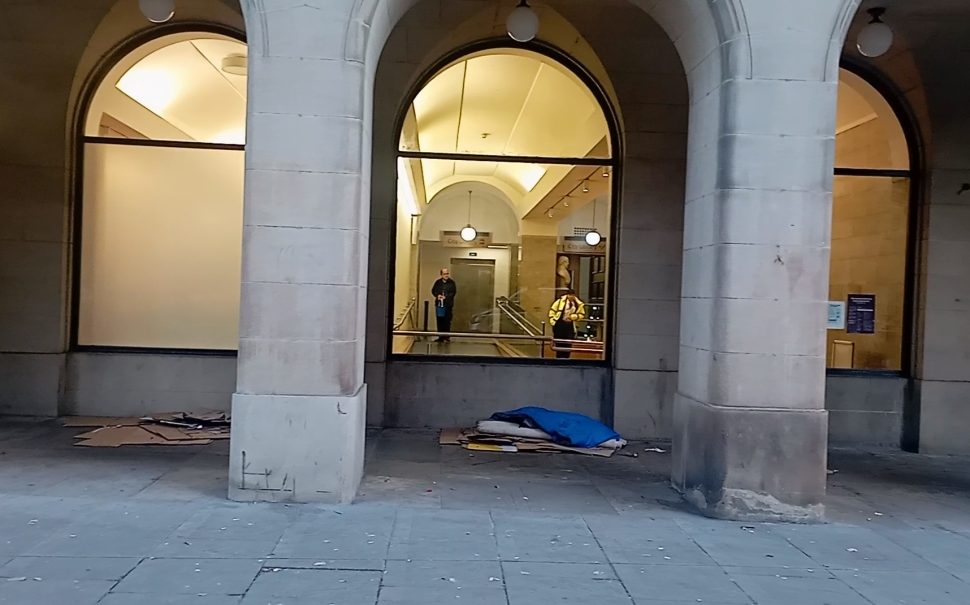They fled famine, war, and persecution. But as Britain’s weather and welfare systems deteriorate, their prospects remain bleak. Thousands of refugees face homelessness across Greater Manchester this winter as the Home Office races to clear the asylum backlog by the end of the year.
“Myself and others are doing everything we can to find a home, but we are caught in a cycle of endless deferrals and miscommunications with no clear solution,” says Adib, a university-educated journalist who left his country when he received threats to his life. “After almost two years of waiting to be granted refugee status, I am desperate to return to work and rebuild my life. It is impossible to do this without the basic assurances of shelter and safety.”
The crisis unfolding on streets across the region comes as Rishi Sunak’s pledge to eliminate 91,000 “legacy” asylum claims puts unprecedented strains on housing and third sector services. Accelerating the rate at which cases are processed has created a surge in recognised refugees, who have a maximum of 28 days to leave their Home Office accommodation.
Although the All-Party Parliamentary Group on Refugees was told last week that the Home Office is working “to try and improve this point of transition” for people quitting asylum accommodation, a short-term solution is yet to be outlined. In Greater Manchester, up to 3,000 asylum seekers are expected to be granted refugee status by the end of the year. It is unclear where they will live.
“Perfect storm” for homeless crisis
The growing pressure on local authorities to accommodate these individuals from their increasingly strained budgets has created a “perfect storm” that will leave many homeless, according to the Local Government Association. In Greater Manchester, authorities estimate that the number of refugees at risk of homelessness could double or treble. A further 2,500 refugees are likely to need rough sleeping and homelessness support across the city-region by the end of this year.
Already, Bury Council has reported that approximately 70% of all registered rough sleepers throughout the borough are new refugees. The Manchester-based refugee homelessness charity Boaz Trust has likewise recorded a 150% increase in referrals for its services since last year.
Faced with a rapidly growing refugee population, local councils are only obliged to house those with “priority need for accommodation”. Refugees who do not qualify for this – predominantly single, healthy men aged below 35 – are simply directed to alternative resources such as flatshare website SpareRoom and local charities. However, these avenues are often equally unable to accommodate the full extent of those in need.
“Support services across the country are piecemeal, creating a postcode lottery for housing assistance,” Dave Smith, CEO of homelessness charity Stepping Stones Project, explains. “Refugees who have been granted asylum must navigate this rapidly shifting situation in a foreign language, with limited support and intense time pressures. The result is that very vulnerable people are slipping between the cracks in a complex and uncompromising system.”
“I contacted the council for help finding accommodation when I received my eviction notice, but received no communication or support in time. When it was time to leave the asylum accommodation, I was forced to sleep in a tent that I borrowed from another asylum seeker,” says Adib. “The tent was extremely cold and filled with a pool of water. A group of young boys who were part of a gang were very aggressive to me – one threatened me with a knife.”
Leaders across the region have been outspoken in their criticism of the growing pressures and limited funding from Westminster, which is undermining earlier work to tackle rough sleeping in Greater Manchester. “More joined-up working in Government and sustained investment in local services to increase capacity are urgently needed so that the risk of homelessness can be removed for all,” a spokesperson for the Greater Manchester Combined Authority says.
Locked out of the private sector
In Greater Manchester, refugees must instead find private accommodation in the midst of a housing crisis that has seen local rents rocket and housing supply shrink. The housing benefits that refugees receive whilst they seek work are unable to cover the vast majority of local rents. In June, Greater Manchester Combined Authority estimated that just 4% of new tenancies across the region were affordable with Local Housing Allowance rates, which have remained frozen since 2020. “The process of seeking accommodation is just an empty circle,” says Adib. “The council are unable to help, so refer you to the private sector to find accommodation. But private landlords will not offer tenancies to people who have just secured refugee status as we are seen as financially high-risk.
“Refugees are stuck in a double-bind between the council and the private sector that leads nowhere: we remain without a home, a job, or government help.”




